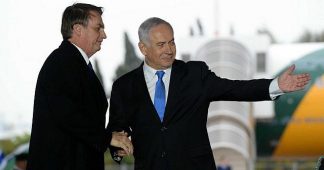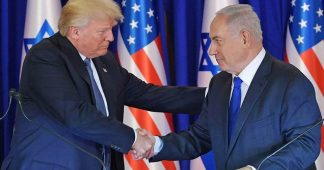Apr 8, 2019
“I love Israel,” Brazilian President Jair Bolsonaro declared in Hebrew as he kicked off his charm offensive on a four-day visit to Israel on March 31. His trip, days prior to the country’s April 9 general election, aimed to offer an important boost to Prime Minister Benjamin Netanyahu’s election prospects.
In the midst of a tough — not to mention dirty — reelection campaign, Netanyahu has emphasized his foreign policy acumen, an area in which his main competition, Kahol Lavan chief Benny Gantz, has less experience.
Netanyahu’s outreach to Latin America over the past decade — similar to his diplomatic efforts across Africa, Asia, and the Gulf — has been geared toward enhancing Israel’s international stature. Leveraging foreign and domestic policy objectives among key Latin American nations, Netanyahu has sought to strengthen Israel’s political and economic ties with the region while simultaneously boosting his leadership credentials.
Although Israel’s relations with Latin America date to the pre-state days, it was not until 2009, when Avigdor Lieberman became foreign minister, that Israel made concentrated efforts to strengthen ties with the countries of the region.
In September 2017, Netanyahu, donning the hat as foreign minister concurrently, became the first Israeli prime minister to visit South and Central America, making stops in Argentina, Paraguay, Colombia, and Mexico to, in his words, “mark a new era in relations between Israel and Latin America.”
Bolsonaro, who was inaugurated in January in a ceremony attended by the Israeli prime minister, has proven a willing partner for Netanyahu. In part in an attempt to attend to his evangelical supporters and garner favor with US President Donald J. Trump, Bolsonaro has played up his pro-Israel stance and, concomitantly, abandoned Brazil’s former pro-Palestinian and pro-Iranian position. To this end, in his election campaign last year, Bolsonaro promised to follow the United States in relocating Brazil’s embassy from Tel Aviv to Jerusalem, a move considered to preempt final status negations over the contested city.
While reneging on this campaign pledge under pressure from his economic team and Brazil’s powerful farm lobby, Bolsonaro did — to the dismay of the Palestinian Authority — open an official diplomatic trade office in Jerusalem. As the world’s largest exporter of halal meat, critics of the move argued that a relocation of the embassy would hurt Brazil’s meat exports to Muslim countries, such as Turkey and the Middle East, which have an annual value of $16 billion.
Following US Secretary of State Mike Pompeo’s lead, Bolsonaro also became the first sitting world leader to accompany an Israeli prime minister to the Western Wall. The visit equally provided an opportunity to engage in bilateral economic partnerships and, in line with Bolsonaro’s flagship domestic policy project, cement security agreements. While it is unclear what these security agreements involve, a report by the Israeli newspaper Haaretz indicated that during prior visits, Brazilian officials engaged in talks with their Israeli counterparts to acquire drones with facial recognition to pursue criminal suspects and reduce Brazil’s high crime and murder rate.
The objectives driving Brazil’s heighted engagement with Tel Aviv have also propelled Israel’s increased influence across other Latin American countries. Since September 2017, Netanyahu has visited Latin America four times.
Two political changes, in particular, are driving the region’s embrace of Israel: the increased political influence of evangelicals and the rise of right-wing populism. Following the election of right-wing Mauricio Macri in 2015, for instance, Israel’s relationship with Argentina improved dramatically; one of their shared goals includes curbing Hezbollah’s global footprint.
The desire to garner favor with Trump, who has displayed a preternatural pro-Israel agenda, provides a further impetus for Latin American countries to inch closer to Israel. The US president’s recent announcement that he intended to cut aid to countries like Guatemala, which already has an embassy in Jerusalem, and Honduras, has the potential to reinforce Israeli influence. The countries were two of just eight countries to vote against the United Nations General Assembly resolution of December 2017, which sought to condemn the relocation of the US embassy to Jerusalem. Their move did not go unnoticed as they were subsequently invited to then US Ambassador to the United Nations Nikki Haley’s “friendship party.” Honduras was also able to rely on Netanyahu’s help in acquiring a three-way meeting with Pompeo during his visit to Brazil; in return, Israel is expecting Honduran President Juan Orlando Hernández to move his embassy to Jerusalem.
Beyond the anticipated support in international forums, such as the United Nations, Israel stands to benefit from closer economic ties with Latin America, not least due to its ability to leverage the demand for security and development technology.
Security is, for instance, one of the leading aspects in cooperation between Colombia and Israel. In the wake of the 2016 peace agreement that ended the fifty-year conflict between the government and FARC rebels, Colombia, which has the largest number of landmines after Afghanistan, sought expertise from the Israeli Defense Ministry on mitigating the threat of explosive devices. Prior to this, a leaked cable indicated that Israel provided Bogota with military training, advice, and arms to confront the Marxist-Leninist FARC.
In Mexico, Israel has been able to introduce private sector agricultural innovations. Last year, Mexican industrial group Mexichem acquired 80 percent of Israeli company Nefatim, the world’s largest provider of drip irrigation systems; since then, it established an investment hub in Israel to scout for start-ups boasting technologies that address water scarcity and flooding.
The economic growth potential in emerging markets like Latin America, moreover, make it an attractive destination for Israeli investors. According to forecasts, despite ongoing economic volatility, the region is set to expand over the next few years, with economic growth expected to increase from 2 percent in 2019 to 2.5 percent in 2020. The Israeli government is currently endorsing long-term investment channels in Latin America to take advantage of these developments. One of the most recent initiatives includes investing Israeli capital — in the form of retirement savings — in regional infrastructure projects in partnership with the Inter-American Development Bank.
With polls suggesting that Netanyahu is likely to secure another term, Israel will continue to look west to secure strategic objectives. In the past few months, Netanyahu has sought to utilize the political crisis in Venezuela to restore ties with the country and challenge the pro-Palestinian — and anti-Israeli — narrative favored by former President Hugo Chavez. Netanyahu hopes that, if the US-backed interim president, Juan Guaidó, manages to consolidate power, he will make good on his promise to restore ties with Israel. In the meantime, the prime minister will not shy away from using any tools at his disposal, including his influence in the White House.
* Grace Wermenbol specializes in the contemporary geopolitics of the broad Middle East and North Africa (MENA) region.











